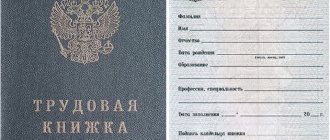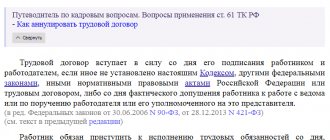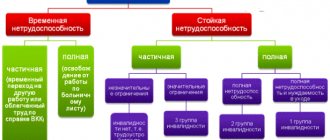General provisions
After signing the agreement, the parties have mutual rights and obligations, which they must strictly observe: the citizen undertakes to work and obey the work schedule in force in the organization, and the employer undertakes to provide the citizen with the work specified in the document and pay wages on time.
Before concluding an employment contract, the employer is obliged to familiarize the future employee with the local regulations of the organization, job description, work schedule, and payment terms. After this, a contract is signed, an order is issued to hire the person and a corresponding entry is made in his work book.
A template, a blank sample employment agreement is contained in Government Decree No. 858 of 08/27/2016.
Article 66. Work record book
The work book of the established form is the main document about the employee’s work activity and length of service.
The form, procedure for maintaining and storing work records, as well as the procedure for producing work record forms and providing them to employers are established by the federal executive body authorized by the Government of the Russian Federation.
The employer (with the exception of employers - individuals who are not individual entrepreneurs) maintains work books for each employee who has worked for him for more than five days, in the case where work for this employer is the main one for the employee.
The work book contains information about the employee, the work he performs, transfers to another permanent job and the dismissal of the employee, as well as the grounds for termination of the employment contract and information about awards for success in work. Information about penalties is not entered into the work book, except in cases where the disciplinary sanction is dismissal.
At the request of the employee, information about part-time work is entered into the work book at the place of main work on the basis of a document confirming part-time work.
Part six is no longer valid.
back to contents
Meaning of the contract
According to Art. 37 of the Constitution of the Russian Federation, each citizen independently chooses his type of activity and specialty. Work is carried out under conditions that do not contradict safety and hygiene requirements. And remuneration must be paid by the employer on time and in full twice a month.
The contract, completed and signed by the parties, is a fundamental legal fact that determines the emergence, change and termination of the official relationship between the employer and employee. It establishes the legal relationship between the worker and the employer and is a set of rules that govern the official relations between the parties who signed the document.
An employment contract is fundamentally different from contracts of a civil law nature (contract, copyright, performance of a certain type of work). Despite their similarities, they differ in the following parameters:
- the subject of the employment contract is the employee’s work. The subject of civil contracts is the final result (book, painting, project);
- an employment agreement presupposes personal performance of work; it cannot be reassigned to another performer. In civil law, this obligation is enshrined in the text of the document;
- under an agreement under the Labor Code of the Russian Federation, the employee is subject to the internal rules of the organization. In civil law there is no such obligation;
- When concluding an employment contract, the employer creates normal and safe working conditions. Under civil law, the employee independently organizes his workplace.
What laws is the concept of parties to an employment contract based on?
General regulation of all aspects of drawing up an employment contract is the responsibility of Chapter 10 of the Labor Code of the Russian Federation. This chapter deciphers the basic concepts that are used when drawing up an employment contract, and also allows you to obtain information about what should be included in the text of the agreement itself.
As for the parties to the contract, this concept, as well as its decoding, are fundamental to the document being drawn up, as a result of which the interpretation of this concept is assigned to Article 56. However, within the framework of this article only an indication is given that the parties to the employment contract are the employer and the employee . But nevertheless, such information allows us to say that in this case it is only possible to interpret the employment contract as a legal act of an individual type, that is, not allowing for a broad interpretation and inclusion of other persons in its participation.
Types of employment contracts
There are different types of contracts with employees, depending on the conditions included in it. The employer has the right to develop separate employment contract forms for these cases in order to quickly fill them out.
Most often, an agreement with employees is concluded for an indefinite period of time, that is, it does not specify the validity period of the document. But sometimes it sets a time frame depending on the nature of the work or the conditions under which it is performed. Such cases are considered in Part 1 of Article 59 of the Labor Code of the Russian Federation.
By validity period:
- prisoners for an indefinite period;
- prisoners for a specified period (not more than 5 years).
A fixed-term employment contract becomes indefinite if, after the expiration of the time specified in it, the employee continues to work. In such a situation, the document loses its urgency and is considered concluded for an indefinite period. It is allowed not to draw up a new, unlimited contract.
An open-ended contract can become a fixed-term contract, but this should be justified by the paragraphs of Art. 59 Labor Code of the Russian Federation. To transfer, you must terminate the previous one and enter into a new contract for a certain period.
By the nature of the working relationship:
- by main place of employment;
- part-time (part-time work is impossible without concluding an employment contract, this is the main condition for this type of employment);
- temporary work (if the nature of the work requires it to be completed in less than 2 months, if it is necessary to replace an employee on sick leave);
- short-term contract;
- with seasonal workers;
- with employees working from home;
- on state (municipal) service.
Please note: the Labor Code of the Russian Federation and other legal acts related to labor relations do not apply to certain categories of citizens, provided that they are not employers or their representatives:
- military personnel in the performance of military duties;
- persons working on the basis of civil contracts;
- other persons established by Federal Law (Article 11 of the Labor Code of the Russian Federation).
By type of employer:
- agreements concluded with organizations - legal entities and individual entrepreneurs;
- an employment contract with an individual - when the employer is a citizen without registration as an individual entrepreneur. Most often they hire service personnel.
Depending on the legal status of the employee:
- signed with minor citizens;
- prisoners with persons who have family responsibilities;
- registered with foreigners;
- signed with stateless persons.
By the nature of working conditions, the division is as follows:
- under normal working conditions;
- taking into account occupancy at night;
- concluded with citizens working in the regions of the Far North and in territories equivalent to them;
- in working conditions in hazardous production.
Types depending on the volume of work performed:
- about the main job;
- about part-time work.
In the first case, the employee works full-time for the employer throughout the working day. This is where he keeps his work book.
In the second, a person works in his free time from his main job. The duration of such work is no more than four hours a day. The document signed with the employee indicates that the work performed is part-time. Such a document is allowed to be concluded both at the main place of employment and with another employer. Part-time work is allowed with an unlimited number of employers, except for exceptions established by the legislation of the Russian Federation.
It is not allowed to enter into part-time contracts with persons under 18 years of age and with those whose main work is classified as difficult or performed in hazardous working conditions, if the part-time job implies the same characteristics.
Particular attention is paid to contracts concluded with management employees. When compiling them, there are some features, in comparison with other categories of workers, that should be paid special attention to.
Test with answers on the topic: “Labor Law”
1.What is the subject of labor law? A. Products produced by workers B. Products for industrial purposes and consumer goods C. Social relations in the field of production activities + D. Method of regulating industrial relations
2. What is the period for registration of an employment contract by an individual employer: A. 7 days+ B. 3 days C. 10 days from the date of conclusion D. 1 month
3. What is Labor Law? A. Branch of science B. Institute of Law C. Academic discipline D. Branch of law+
4. What are legal relations under labor law? A. A set of techniques and methods for regulating labor law B. A range of social relations regulated by the norms of labor law + C. A set of norms arranged in a certain sequence, in a logical connection with each other and separate their individual institutions (sub-institutions) of labor law D. Relations according to production and distribution of material goods among employees of organizations
5. From what moment does the employment contract come into effect? A. 5 days after signing. B. from the moment of imprisonment. B. after state registration. + D. from the moment of proclamation of the employment contract.
6.What is the labor law system? A. Regulations of labor relations B. Labor Code of the Russian Federation C. Structure, a set of legal norms that make up a single whole, broken down into legal institutions + D. A group of norms regulating similar labor relations
7. Who is not subject to employment tests? A. Persons of retirement age B. Persons liable for military service C. Disabled persons D. Workers under 18 years of age.+
8. What is a unitary enterprise? A. Independent state enterprise B. Independent municipal enterprise C. Commercial organization not vested with the right of ownership of property allocated to it by the owner + D. Commercial organization with separate property
9. What types of employment contracts exist based on their duration? A. urgent, unlimited, for the duration of a certain work. + B. Urgent, unlimited. B. Short-term, medium-term, for the duration of a certain work. D. Short-term, seasonal, long-term.
10. What are the types of subjects of labor law A. Individuals and legal entities + B. Participants of PAs endowed with subjective labor rights and responsibilities C. Unitary enterprises D. Cooperatives
11. What document is not required when applying for a job? A. passport B. birth certificate+ C. work book D. diploma
12.What are the features of the labor law method? A. A combination of imperative and discretionary methods of regulating labor relations+ B. Absence of sanctions C. Impossibility of concluding an employment contract before reaching the age of 16 D. Mandatory obedience to internal labor regulations for all employees
13.Who are the subjects of labor law? A. Individuals and legal entities B. Participants of PAs endowed with subjective labor rights and obligations+ C. Unitary enterprises D. Cooperatives
14.How long is the probationary period for workers? A. 3 months. B. 10 days C. 1 month+ D. 6 months.
15. What is a trade union? A. Voluntary public association of citizens bound by common production and professional interests in order to protect the labor rights of the interests of their members + B. Voluntary association of citizens on the basis of membership, organized for the joint conduct of economic or other activities C. Voluntary union of entrepreneurs for joint solution of production problems D Voluntary association of legal entities for representation and cooperation with foreign legal entities
16.What does the concept of “work collective” include? A. Legislatively fixed as an object of Labor Law B. Not legislatively fixed as a subject of Labor Law C. Regulated by the Labor Code of the Russian Federation + D. Regulated by the Law of the Russian Federation “On Collective Bargains and Agreements”
17. What is the labor law method? A. A set of methods and methods for regulating labor law relations+ B. A set of methods and methods for protecting labor law C. Methods and methods of distribution under labor law D. Technology of production of products and goods
18.What condition is important when transferring an employee to another enterprise, or transferring to another position? A. Consent of the employee.+ B. Necessity of the work process. B. Requirement of management D. Decision of the workforce.
19.What is a cooperative? A. Voluntary public association of citizens connected by common production and professional interests in order to protect the labor rights and interests of their members B. Voluntary association of citizens on the basis of membership, organized for the joint conduct of economic or other activities + C. Voluntary union of entrepreneurs for joint solution of production problems D. Voluntary association of legal entities for representation and cooperation with legal entities abroad
20.Which day is considered the day the employee is completely dismissed from work? A. Last day of work B. Next after the last day of work C. Day of issue of the work book + D. Next day, after the day of issue of the work book
21. What does discrimination in labor mean? A. Refusal to hire due to failure to reach the age of 16 B. Refusal to hire due to the citizen’s state of health C. Refusal to hire due to deprivation of his right to occupy the specified position D. Refusal to hire due to social origin +
22. Is the employer obligated, in the event of dismissal of an employee on the employer’s initiative, to give the employee a copy of the order: A. Obligated under any circumstances B. Not obligated. B. Obligated if required by the employee + D. Obliged only with the permission of the head of the personnel department
23. What is the basis for the emergence, change and termination of labor relations? A. Legal fact B. Legal composition C. Employment contract + D. Administrative act
24. What is considered absenteeism? A. Absence from work for more than 3 hours B. Absence from work for more than 3 hours+ C. Absence from work during the day D. Absence from work for more than 2 days
25.What are the features of labor relations? A. Established by the Constitution of the Russian Federation B. Have a personal, compensated, lasting character + C. Independent D. Independent
Contract form
Organizations and individual entrepreneurs use the standard form of an employment contract with an employee, approved by Decree of the Government of the Russian Federation No. 858 of August 27, 2016.
The agreement is drawn up in writing in two copies. Each copy is signed by the director and employee. One is given to the employee, the second is kept by the employer. To indicate receipt of a copy, the employee puts a personal signature on the document kept by the employer.
If the employee began work with the knowledge of the employer, the contract is considered concluded, even if it was not drawn up in writing.
Example of a completed employment contract:
Parties
The parties are the employee and the employer.
An employee is an individual who is 16 years of age or older. The law does not prohibit signing a contract with 14-year-olds. But subject to certain conditions:
- the work is easy;
- does not disrupt the educational process;
- there is the consent of an official representative, most often this is the teenager’s parent.
If a young child is needed, for example, for a role in a movie or theater, then, in addition to the previous conditions, the consent of the guardianship authorities will be required. And also evidence that the work will not cause physical, psychological or moral harm to the child.
An employer is a legal or natural person who is not prohibited from entering into agreements to hire an employee.
Content
According to Article 57 of the Labor Code of the Russian Federation, the document must contain the following information:
- FULL NAME. employee and name of the employing company;
- passport details of the employee (and the employer, if he is an individual);
- employer's tax identification number;
- date and place of signing.
The following information regarding a person’s professional activity is required to be included in the document:
- place of work. Usually this is the organization itself. If the organization has structural divisions, then the place of work is considered to be the division specified in the employment contract;
- position according to the staffing table;
- start date of work (if a fixed-term contract is concluded, its validity period is indicated);
- terms of remuneration (including tariff rate, additional payments, allowances and incentive payments);
- work and rest schedule. If they differ from the general rules established in the organization, then they should be discussed with the job applicant;
- guarantees provided by law and internal regulations;
- nature of the work;
- working conditions in the workplace.
Additionally, they stipulate the rights and obligations of the employee and employer established by the Labor Code and internal regulations of the organization.
In addition, sometimes additional conditions are included:
- about the probationary period;
- on non-disclosure of trade secrets;
- on non-disclosure of secrets protected by law;
- on the types and conditions of additional employee insurance;
- on the employee’s obligation to work for a certain period of time after training, which was carried out at the expense of the employer;
- about financial liability and others.
The completed document is signed by the parties. If changes need to be made to it, the new information is drawn up in the form of an additional agreement.
For non-compliance with the rules for drawing up a contract, the labor inspector, in the case of checking personnel documentation, imposes an administrative fine.
Article 68. Registration of employment
Hiring is formalized by an order (instruction) of the employer, issued on the basis of a concluded employment contract. The content of the order (instruction) of the employer must comply with the terms of the concluded employment contract.
The employer's order (instruction) regarding employment is announced to the employee against signature within three days from the date of actual start of work. At the request of the employee, the employer is obliged to provide him with a duly certified copy of the specified order (instruction).
When hiring (before signing an employment contract), the employer is obliged to familiarize the employee, against signature, with the internal labor regulations, other local regulations directly related to the employee’s work activity, and the collective agreement.
back to contents
Structure
The document consists of several sections, each of which sets out the rights and obligations of the employer and employee. Typically the contract contains the following sections:
- Details of the parties: name of organization, address, full name. manager, full name applicant for the position, his contact details.
- The following usually contains an indication of the position and the division of the enterprise where the applicant will work.
- The following paragraph describes the rights and obligations of the parties. This stipulates the responsibilities of the employee, which he performs in accordance with the job description developed at the enterprise, and the responsibilities of the employer. These include paying wages within a certain time frame, providing subordinates with a safe workplace, equipment, and so on.
- The next section regulates work and rest regimes, specifies the wage rate and internal regulations.
- Sometimes they include a section with additional conditions that do not fall into the main parts of the contract.
- At the end the signatures of the parties and the date are placed.
If, when concluding a contract, some information or listed conditions are not included, this is not a basis for declaring it invalid or a reason for termination. The document is supplemented with missing information. They are included either in the text itself or indicated in a separate agreement between the parties. The additional agreement is also drawn up in two copies and signed by each party.
ConsultantPlus experts discussed how to draw up an extract from an employment contract. Use these instructions for free.
Termination
Termination of a working relationship is permitted at the initiative of the employee (at his own request) and at the initiative of the employer.
Termination at the initiative of the employee occurs when writing a letter of resignation. Usually, in this case, no difficulties arise, unlike the termination of a working relationship at the initiative of the employer. Termination by the employer is permitted before the end of the probationary period with three days' notice in writing. If the probationary period is completed successfully, then termination of the work contract is permissible only in the following cases:
- liquidation of the enterprise;
- staff reduction;
- repeated failure by an employee to fulfill his duties, repeated appearance at the workplace in a state of alcohol, drugs or other intoxication;
- committing theft, embezzlement, intentional causing of material damage;
- other cases specified in Art. 81 Labor Code of the Russian Federation.







